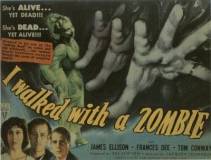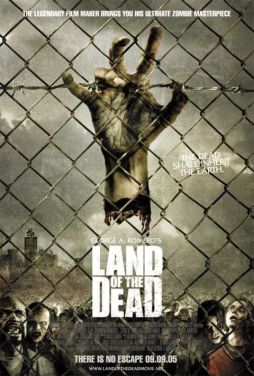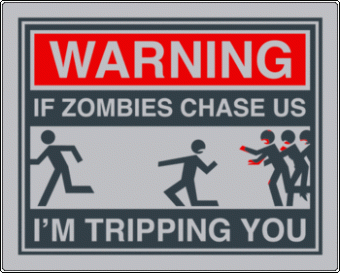A history of Zombie evolution through the 20th century is beyond my scope here, and I’ll confine myself to a discussion of the genre, post-Romero. The old resurrection of corpses by a lone human agent, whether through Voodoo or arcane science, is sufficiently similar to the Frankenstein myth to enter into a separate analysis, another time.
Zombies as individual threats have, over time, been replaced by zombie hordes and ultimately by the all-inclusive Zombie Apocalypse, so familiar to audiences nowadays that exposition in films can be all but dispensed with, and we can proceed straight to the grisly action. How and why Armageddon happened hardly matters (we can reasonably infer it the result of human perversion,) only when, where, and most importantly, to whom. The phrase “zombie apocalypse” has become a widespread joke, masking deep-seated cultural anxieties about the future, with tentative laughter, while we quietly dig our holes (whether real or symbolic) and fill them with canned goods.
Apocalyptic tales in general are a cultural fantasy of starting over, because the mess we’re in now (economic, moral, political –- pick your poison) is just too deep, and nothing less than a scouring down to a clean bottom, not unlike the flood from which Noah escaped with his chosen few, will set things straight. Here I use the term “Fantasy” as not just the imaginative incarnation of a desire, but also an unconscious fear. We can never, by force of will and cooperation, dig ourselves out of the mire of industrial waste and human sewage we ourselves have created. This societal attitude finds its way symbolically into the story: instead of harnessing the id-energy to just “Run!,” most of the disposable characters simply cry, stumble, give up. Are the “tough” characters any better? On this archetypal level, both the “strong” wish to carry on and start over, and the “weak” act of simply falling down and letting the disaster overtake you, amount to the same abandonment of hope in society, as it now stands. In short, the apocalypse is a dramatization of the embracing of our race, collectively, of that deadliest of all sins: despair.
But what makes the Zombie Apocalypse so special?
The eating of the flesh, but especially the dainty of the brain, is telling. For it’s the left brain, the logic and the reason, that have brought all the crud down upon us by overwhelming the dictates of the right, creative and compassionate, and therefore undervalued, side of the mind. Today, computers replace the arts, infodata replaces knowledge, and destructive weapons replace generative technology. Therefore, in the aftermath of the fall, humans are often reduced to lower and lower forms of tech (trucks, then guns, chainsaws, finally axes and clubs,) and communications fail. For those paying attention to every detail, note the prevalence of images and use of the bare hands. Poetic justice.
Like the decline of civilization itself, the advance of zombies may at times be shambling and slow, but it is inevitable, and ultimately no escape is possible. They have the numbers, and the inexorable force of inertia. The horde is only the virus writ large. To spread, absorb, and move on is its very nature.
Enter our small band of resistors —- white blood cells incarnated –- varying from a single person to perhaps six or eight defined characters. Most will be claimed, one by one, amid the agonizing recognition that once someone gets infected, there’s simply nothing to be done. Unlike an alcoholic or addict who can get into a program and be reclaimed by, in a word, love, these stories tell us that love and trust are not enough, because they’re overpowered by too many other factors, mindless selfishness foremost (sometimes disguised as survival instinct.)
And that’s the point. Although it only explicitly resurfaces occasionally, inspired by the Romero sequel Dawn of the Dead, zombie stories, amid their barren landscapes, do furnish fertile ground for social criticism. They almost always employ an isolated setting and a microcosm of disparate characters, the last representatives of types of people now gone. The plot archetype beneath the collective and individual struggle for survival emerges as what Campbell called the Scapegoat Myth, wherein other human beings are sacrificed impulsively for one’s own personal safety/comfort (as in the all-too-human pushing of someone aside to escape the pursuing horde), or ritualistically, for the supposed good of the community at large, as simply told in the classic Shirley Jackson tale “The Lottery,” or most recently convoluted by Joss Whedon in his Cabin in the Woods (2011). In such tales, Man is revealed as the most monstrous Thing of them all, because alone among created beings does he turn on his own kind – zombies, aliens, pirahna, at least, do not eat each other. But a man will slay his brother, or steal his life savings, or repossess his house, or covet his wife. All in slavish worship of his insatiable hunger.
Afraid of what might happen? Brother, the symbols are telling us it’s already happening.
Digest this refrain from The Hooters’ 1985 song “All You Zombies”:
All you zombies hide your faces
All you people in the street
All you sittin’ in high places
The rain’s gonna fall on you
* * * *
Endings of these stories vary according to the temperaments of the writers, but, almost always, there is little hope for humankind to be gleaned from them. This runs counter to the typical Hollywood paradigm, and may partially explain the resistance of Big Money to embrace the genre. Mainstream films in America like to offer hope. But the perennial willingness to scapegoat others signals, unavoidably, hope’s antithesis: humans, as a species, haven’t evolved enough resistance to the disease of our desires and fears, and don’t deserve to survive.



[…] him out!” And his mandate did not stop short of murder. In the first post from this series, Zombie Apocalypse Now, I alluded briefly to this horrific phenomenon of human sacrifice, which people today foolishly […]
LikeLike
[…] series analyzing the enduring popularity of certain types of ghastly figures and horror stories (Zombies and Human Sacrifice have been covered in parts 1 and […]
LikeLike